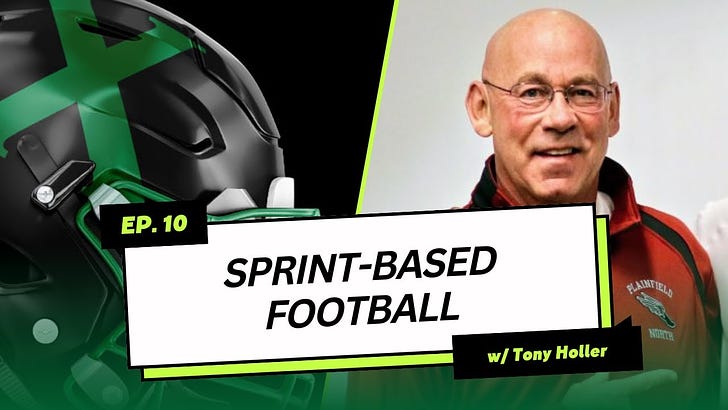Sprint-Based Football or "Feed the Cats" Philosophy: A Recap of Tony Holler's Insights
In January on the Board Drill Podcast, listeners were treated to a captivating conversation with Tony Holler, a highly respected track coach renowned for his innovative training philosophy dubbed "Feed the Cats." Hosts Kyle Bradburn and Coach Dixon guided the discussion, delving deep into Holler's unique approach to athlete development and performance optimization.
The "Feed the Cats" Philosophy
Central to the conversation was Holler's "Feed the Cats" philosophy, which prioritizes quality over quantity in training. Rather than subjecting athletes to grueling and excessive workouts, Holler advocates for short, high-intensity training sessions designed to maximize speed and athleticism. This approach not only enhances performance but also minimizes the risk of injury and burnout, allowing athletes to perform at their peak while preserving their long-term health.
Identifying Key Indicators
The conversation commenced with a discussion on the importance of recognizing key indicators that signal an athlete's well-being and performance. Holler emphasized the significance of speed as a reliable barometer of an athlete's health, highlighting how fluctuations in speed could hint at underlying issues such as inadequate sleep or mental stress. By closely monitoring these indicators, coaches can intervene early to support their athletes and address potential issues before they escalate.
Impact on Football and Other Sports
The conversation explored the unique impact of the "Feed the Cats" philosophy on various sports, particularly football. Holler shared anecdotes of football players who experienced remarkable improvements in speed and performance after embracing his training methods. By integrating speed training into football programs, coaches can enhance their players' overall athleticism, agility, and competitiveness, giving them a strategic edge on the field.
Redefining Hard Work
One of the podcast's most thought-provoking moments occurred when Holler challenged the conventional notion of hard work equating to success. He cautioned against the dangers of overworking athletes, citing examples of individuals who suffered burnout as a result of excessive training demands. Instead, Holler advocated for a balanced approach to training that prioritizes quality over quantity, allowing athletes to achieve their full potential without sacrificing their health and well-being.
Mental Health and Athlete Support
Holler underscored the importance of caring for athletes' mental health and creating a supportive environment conducive to their overall well-being. By fostering a culture of trust, understanding, and support, coaches can empower athletes to navigate the challenges of competition while maintaining their mental resilience. Prioritizing athletes' mental health not only enhances their performance but also fosters stronger bonds between athletes and coaches, laying the foundation for sustained success.
Conclusion
Tony Holler's insights into the "Feed the Cats" philosophy offer a paradigm shift in coaching and athletic training. By prioritizing speed, quality training, and mental health, coaches can empower their athletes to excel both on and off the field. As coaches continue to evolve and innovate, embracing methodologies like "Feed the Cats" holds the promise of enhancing performance, fostering athlete well-being, and cultivating a more sustainable and successful sports culture overall.
Implementation
Implementing the "Feed the Cats" philosophy into a high school football program requires careful planning, dedication, and a commitment to prioritizing athlete well-being and performance. Here are actionable steps to integrate this approach successfully:
Educate Coaching Staff: Begin by educating the coaching staff about the principles and benefits of the "Feed the Cats" philosophy. Provide resources such as Tony Holler's materials, articles, and videos to familiarize them with the methodology and its application in football training.
Assessment and Goal Setting: Conduct a comprehensive assessment of the current training program and identify areas for improvement. Set clear, measurable goals for implementing "Feed the Cats," such as improving speed, agility, and overall athleticism among players.
Design Speed-Focused Workouts: Develop speed-focused workouts that prioritize quality over quantity. Incorporate short, high-intensity drills and exercises aimed at improving sprinting technique, acceleration, and top-end speed. Emphasize proper rest intervals to maximize recovery and prevent overtraining. (https://www.youtube.com/@coachtonyholler)
Individualized Training Plans: Tailor training plans to meet the specific needs and abilities of each player. Assess athletes' speed, strength, and mobility levels to create personalized workout routines that address their areas of improvement while minimizing the risk of injury.
Integrate Speed Training into Practice: Integrate speed training components into regular football practices to enhance players' overall athleticism and on-field performance. Incorporate dynamic warm-up drills, agility exercises, and speed development drills to reinforce proper movement mechanics and neuromuscular coordination.
Monitor Progress and Adjustments: Continuously monitor athletes' progress throughout the season using objective measures such as timed sprints, agility tests, and performance metrics. Adjust training protocols as needed based on individual progress and feedback to optimize results and prevent plateaus. (https://store.simplifaster.com/product-category/freelap/freelap-athletic-timing-systems/)
Emphasize Recovery and Nutrition: Educate players on the importance of proper recovery and nutrition in supporting optimal performance. Emphasize the significance of quality sleep, hydration, and nutrient-rich foods in enhancing recovery, fueling workouts, and promoting overall well-being.
Foster a Positive Team Culture: Foster a positive team culture that prioritizes effort, accountability, and mutual support. Encourage open communication between coaches and players, create opportunities for team bonding, and celebrate individual and collective achievements to cultivate a cohesive and motivated team environment.
Evaluate and Adjust Program as Needed: Regularly evaluate the effectiveness of the "Feed the Cats" approach in improving player performance, reducing injuries, and enhancing overall team dynamics. Solicit feedback from athletes and coaching staff to identify areas for refinement and adjustment, ensuring ongoing success and sustainability.
Promote Long-Term Athletic Development: Emphasize the importance of long-term athletic development and player well-being over short-term gains. Instill a mindset of continuous improvement and commitment to lifelong fitness and health among players, preparing them for success both on and off the field beyond their high school careers.
Tony Holler (Feed the Cats) Resources
Twitter (X): https://twitter.com/pntrack
CoachTube: https://coachtube.com/users/tonyholler
FTC Gear: https://www.bonfire.com/results/Feed+the+Cats/
Fee the Cats Equipment
Freelap: Purchase Here




